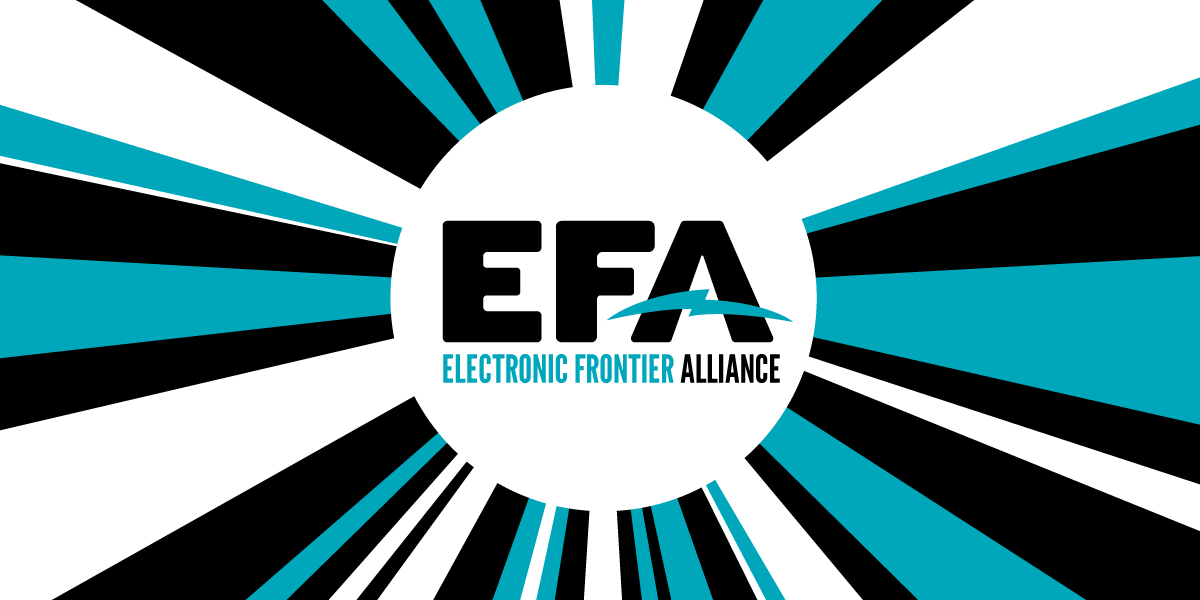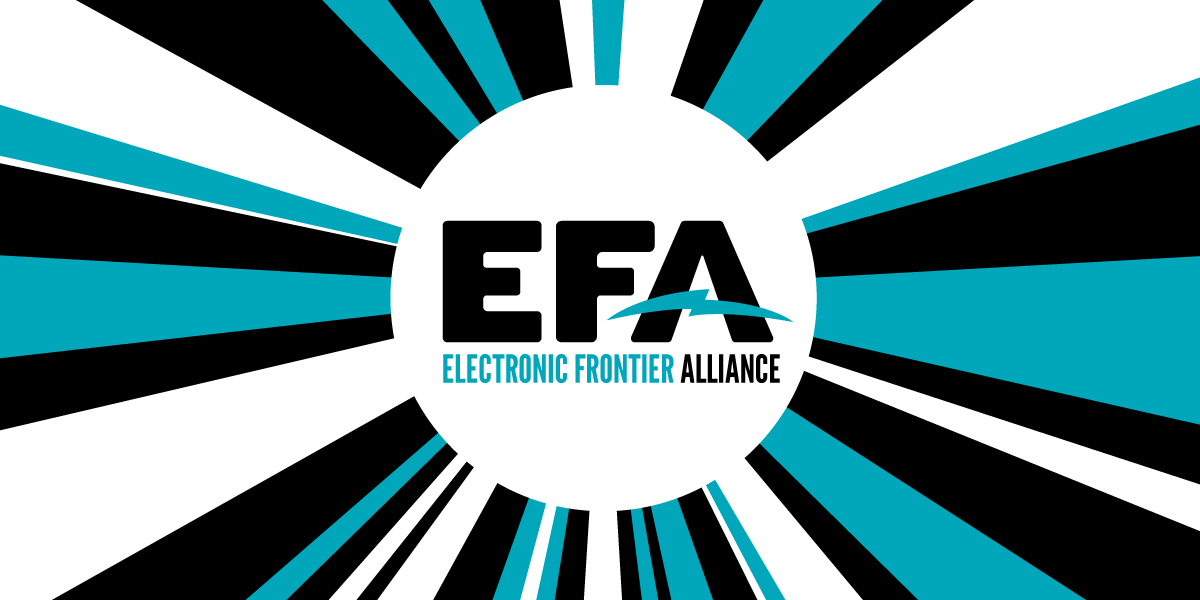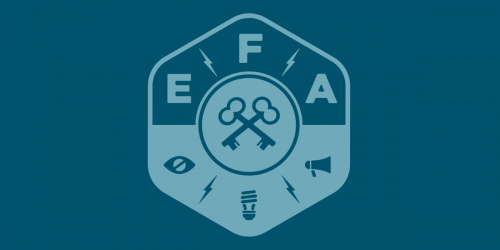Technologists play a huge role in building alternative tools and resources when our right to privacy and security are undermined by governments and major corporations. This direct resistance ensures that even in the face of powerful adversaries, communities can find some safety and autonomy through community-built tools.
One of the most renowned names in this work is the Calyx Institute, a New York based 501(c)3 nonprofit founded by Nicholas Merrill, after a successful and influential constitutional challenge to the National Security Letter (NSL) statute in the USA Patriot Act. Today Calyx’s mission is to defend digital privacy, advance connectivity, and strive for a future where everyone has access to the resources and tools they need to remain securely connected. Their work is made possible thanks to the generous donations of their over 12,000 grassroots members.
More recently, Calyx joined EFF’s network of grassroots organizations across the US, the Electronic Frontier Alliance (EFA). Members of the alliance are not-for-profit local organizations dedicated to EFA’s five guiding principles: privacy, free expression, access to knowledge, creativity, and security. Calyx has since been an exceptional ally, lifting up and collaborating with fellow members.
If you’re inspired by Calyx to start making a difference in your community, you can get started with our organizer toolkits. Once you’re ready, we hope you consider applying to join the alliance.
We corresponded with Calyx over email to discuss the group's ambitious work, and what the future holds for Calyx. Here are excerpts from our conversation:
Thanks for chatting with us, to get started could you tell us a bit about Calyx’s current work?
Calyx focuses on three areas: (1) developing a privacy-respecting software ecosystem, (2) bridging the digital divide with affordable internet access, and (3) sustaining our community through grants, and research, and educational initiatives.
We build and maintain a digital ecosystem of free and open-source software (FOSS) centering on CalyxOS, an Android operating system that encrypts communications, combats invasive metadata collection, and protects users from geolocation tracking. The Calyx Internet Membership Program offers mobile hotspots so people have a way to stay connected despite limited resources or a lack of viable alternatives. Finally, Calyx actively engages with diverse stakeholder groups to build a shared understanding of privacy and expand digital-security literacy and provide grants to directly support aligned organizations. By partnering with our peers, funders, and service providers, we hope to drive collective action toward a privacy-and-rights-respecting future of technology.
Calyx projects work with a wide range of technologies. What are some barriers Calyx runs into in this work?
Our biggest challenge is one shared by many tech communities, particularly FOSS advocates: it is difficult to balance privacy and security with usability in tool development. On the one hand, the current data-mining business model of the tech sector makes it extremely hard to provide FOSS solutions to proprietary tech while keeping the tool intuitive and easy to use. On the other, there is a general lack of momentum for funding and growing an alternative digital ecosystem.
As a result, many digital rights enthusiasts are left with scarce resources and a narrow space within which to work on technical solutions. We need more people to work together and collectively advocate for a privacy-respecting tech ecosystem that cares about all communities and does not marginalize anyone.
Take CalyxOS, for example. Before it became a tangible project, our founder Nick spent years thinking about an alternative mobile operating system that put privacy first. Back in 2012, Nick spoke to Moxie Marlinspike, the creator of the Signal messaging app, about his idea. Moxie shared several valid concerns that almost led Nick to stop working on it. Fortunately, these warnings, which came from Moxie’s experience and success with Signal, made Nick even more determined, and he recruited an expert global team to help realize his idea.
What do you see as the role of technologists in defending civil liberties with local communities?
Technologists are enablers—they build tools and technical infrastructures, fundamental parts of the digital ecosystem within which people exercise their rights and enjoy their lives. A healthy digital ecosystem consists of technologies that liberate people. It is an arena where people willingly and actively connect and share their expertise, confident in the shared protocols that protect everyone’s rights and dignity. That is why Calyx builds and advocates for people-centered, privacy-focused FOSS tools.
How has Calyx supported folks in NYC? What have you learned from it?
It’s a real privilege to be part of the NYC tech community, which has such a wealth of technologists, policy experts, human rights watchdogs, and grassroots activists. In recent years, we joined efforts led by multiple networks and organizations to mobilize against unjustifiable mass surveillance and other digital threats faced by millions of people of color, immigrants, and other underrepresented groups.
We’re particularly proud of the support we provided to another EFA member, Surveillance Technology Oversight Project, on the Ban the Scan campaign to ban facial recognition in NYC, and CryptoHarlem to sustain their work bringing digital privacy and cybersecurity education to communities in Harlem and beyond. Most recently, we funded Sunset Spark—a small nonprofit offering free education in science and technology in the heart of Brooklyn—to develop a multipurpose curriculum focused on privacy, internet infrastructure, and the roles of the public and private sectors in our digital world.
These experiences deeply inspired us to shape a funding philosophy that centers the needs of organizations and groups with limited resources, helps local communities break barriers and build capacity, and grows reciprocal relationships between each member of the community.
You mentioned a grantmaking program, which is a really unique project for an EFA member. Could you tell us a bit about your theory of change for the program?
Since 2020, the Calyx Institute has been funding the development of digital privacy and security tools, research on mass surveillance systems, and training efforts to equip people with the knowledge and tools they need to protect their right to privacy and connectivity. In 2022, Calyx launched the Fusion Center Research Fund to aid investigations into law enforcement harvesting of personal data through intelligence-sharing centers. This effort, with nearly $200,000 disbursed to grantees, helped reveal the deleterious impact of surveillance technology on privacy and freedom of expression.
These efforts have led to the Sepal Fund, Calyx’s pilot program to offer small groups unrestricted and holistic grants. This program will provide five organizations, collectives, or projects a yearly grant of up to $50,000 for a total of three years. In addition, we will provide our grantees opportunities for professional development, as well as other resources. Through this program, we hope to sustain and elevate research, tool development, and education that will support digital privacy and defend internet freedom.
Could you tell us a bit about how people can get involved?
All our projects are, at their core, community projects, and we welcome insights and involvement from anyone to whom our work is relevant. CalyxOS offers a variety of ways to connect, including a CalyxOS Matrix room and GitLab repository where users and programmers interact in real time to troubleshoot and discuss improvements. Part of making CalyxOS accessible is ensuring that it’s as widely available as possible, so anyone who would like to be part of that translation and localization effort should visit our weblate site.
What does the future look like for Calyx?
We are hoping that the future holds big things for us, like CalyxOS builds on more affordable and globally available mobile devices so that people in different locations with varied resources can equally enjoy the right to privacy. We are also looking forward to updating our visual communication—we have been “substance over style” for so long that it will be exciting to see how a refreshed look will help us reach new audiences.
Finally, what’s your “moonshot”? What’s the ideal future Calyx wants to build?
The Calyx dream is accessible digital privacy, security, and connectivity for all, regardless of budget or tech background, centering communities that are most in need.
We want a future where everyone has access to the resources and tools they need to remain securely connected. To get there, we’ll need to work on building a lot of capacity, both technological and informational. Great tools can only fulfill their purpose if people know why and how to use them. Creating those tools and spreading the word about them requires collaboration, and we are proud to be working toward that goal alongside all the organizations that make up the EFA.
Our thanks to the Calyx Institute for their continued efforts to build private and secure tools for targeted groups, in New York City and across the globe. You can find and support other Electronic Frontier Alliance affiliated groups near you by visiting eff.org/fight.











